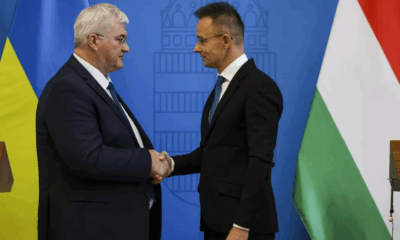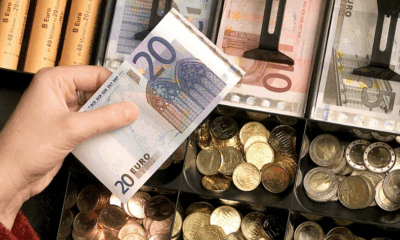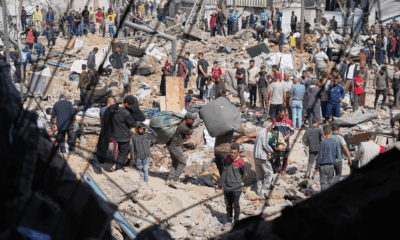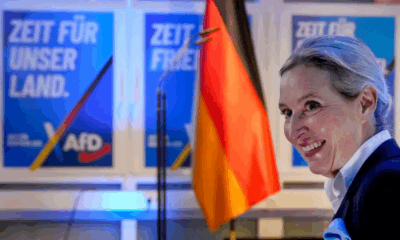News
Storm Darragh Claims Two Lives, Leaves Thousands Without Power Across UK and Ireland
Storm Darragh unleashed devastation across the UK and Ireland on Saturday, bringing wind speeds of up to 149 km/h, claiming two lives, and leaving hundreds of thousands of homes without power. The storm prompted authorities to issue a rare emergency alert to millions of residents in affected areas.
The emergency alert, accompanied by a loud siren-like sound, was sent to about three million households in Wales and southwest England. The warning urged residents to stay indoors as Storm Darragh caused widespread disruption and damage.
Fatal Incidents Amid Severe Weather
In northwest England, a man in his 40s lost his life when a tree fell onto his van while he was driving on a highway near Preston, approximately 58 km north of Manchester. In another tragic incident, a driver was killed by a falling tree in Birmingham’s Erdington area.
The UK’s Met Office issued a red weather warning on Friday, highlighting the severity of the storm. By Saturday evening, the agency announced that Storm Darragh would move eastward by Sunday morning, but advised that strong winds would persist across much of the UK.
Widespread Power Outages and Travel Disruptions
The storm left thousands of homes in Northern Ireland, Wales, and western England without electricity. In Ireland, nearly 400,000 households, farms, and businesses experienced power outages.
Major highways and bridges across the UK were closed due to hazardous conditions, and multiple train services were suspended, leaving commuters stranded. Dublin Airport in Ireland also reported flight cancellations as the storm wreaked havoc.
Emergency Alert Measures
The emergency phone alert sent to affected areas was an unusual step by officials, reflecting the severity of the storm. The message, sent to all compatible mobile devices in the regions, emphasized the need to stay indoors to avoid potential harm from falling trees, debris, and structural damage caused by the high winds.
Looking Ahead
While the worst of Storm Darragh is expected to subside by Sunday morning, meteorologists warned of continued windy conditions. Authorities are urging the public to exercise caution as recovery efforts begin in the wake of the storm.
The impact of Storm Darragh underscores the increasing challenges posed by severe weather, with its trail of destruction serving as a stark reminder of the need for preparedness and resilience in the face of climate-driven events.
News
France, Algeria Expel Diplomats in Escalating Diplomatic Dispute
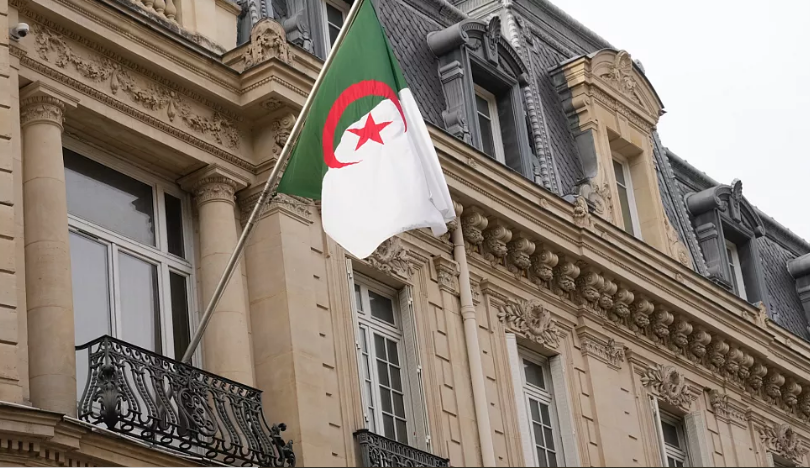
Tensions between France and Algeria have escalated further this week, as both nations continue a tit-for-tat expulsion of diplomats in a worsening diplomatic standoff.
France announced on Wednesday that it will expel an unspecified number of Algerian diplomats in direct response to Algeria’s decision to remove 15 French officials from the country over the weekend. This follows an earlier episode in mid-April, when Algeria expelled 12 French diplomatic personnel, prompting France to retaliate by expelling an equal number of Algerian officials and recalling its ambassador from Algiers.
French Foreign Minister Jean-Noël Barrot confirmed the latest move during an interview with BFM TV, stating that Algerian officials holding diplomatic passports but lacking valid visas to operate in France would be required to leave. He declined to specify the exact number of expulsions, saying, “It’s not so much a question of numbers, it’s a question of quality. Algeria wanted to send back our agents — we’re sending back theirs.”
On Tuesday, the French Foreign Ministry summoned Algeria’s chargé d’affaires to formally notify him of the decision. The diplomatic escalation came just two days after Algeria had informed France’s chargé d’affaires in Algiers that 15 French civil servants on temporary assignments would be expelled.
While Algeria’s Foreign Ministry has yet to release an official statement, the state-run Algerian Press Agency (APS) reported that the expelled French personnel were appointed under what it described as “irregular conditions.”
France responded with a sharply worded statement accusing Algeria of breaching a 2013 bilateral agreement, which governs the movement and duties of officials holding diplomatic, official, or service passports. The statement condemned Algeria’s “new conditions of access” for French officials and described the expulsion as unjustified.
Barrot characterized Algeria’s action as “incomprehensible and brutal,” and insisted that France’s response was “immediate, firm, and proportionate.” He added that further measures could be taken depending on the evolution of the situation.
The dispute adds to a growing list of irritants in Franco-Algerian relations. Key points of contention include Algeria’s refusal to repatriate nationals facing deportation from France and the continued detention of dissident Franco-Algerian writer Boualem Sansal.
Relations took a significant downturn in July 2024, when France expressed support for Morocco’s claim to Western Sahara — a move that angered Algiers, a staunch supporter of Sahrawi self-determination.
Although French President Emmanuel Macron and Algerian President Abdelmadjid Tebboune shared a reportedly positive phone conversation in early April, hopes of a diplomatic thaw appear to have been short-lived.
News
EU Seeks Closer Defence Ties with Ukraine, Citing Battle-Tested Innovation

The European Union has launched a new initiative to deepen defence cooperation with Ukraine, drawing on the war-torn country’s battlefield experience to strengthen European capabilities in key areas such as drone production.
The EU-Ukraine Defence Industries Task Force held its inaugural meeting on Monday, aiming to enhance industrial collaboration between Kyiv and Brussels. The effort was announced by European Commissioner for Defence and Space Andrius Kubilius during the second EU-Ukraine Defence Industry Forum.
Kubilius emphasized the urgency of integrating Ukraine’s rapidly evolving defence sector into Europe’s broader security framework, particularly in light of its advancements in unmanned systems and supply chain resilience.
“Today, we announce the creation of the inter-institutional EU-Ukraine Task Force,” he said. “Ukrainian and European experts will now work together to develop joint projects and facilitate procurement processes that strengthen both our defence industries.”
The task force will focus on priority capabilities, especially explosives and drones. According to Kubilius, Ukraine’s innovation in drone production has positioned it as a global leader in the field. “We need to learn from Ukraine how to create a drone production and operation infrastructure,” he said, asserting that Europe stands to gain even more from this integration than Ukraine.
Since Russia’s full-scale invasion in 2022, Ukraine has increased its annual defence production capacity to €35 billion — a 35-fold rise. Kubilius highlighted Ukraine’s ability to deliver modern, cost-effective defence solutions, describing its companies as “fast” and capable of producing at “half the price” of their European counterparts.
Alexander Kamyshin, an advisor to President Volodymyr Zelenskyy, told the forum that the ongoing conflict would be remembered as “the first world drone war.” He noted Ukraine’s success in developing autonomous targeting systems and swarming drone capabilities, technologies he said the country is willing to share with European allies.
“We’re here to build the arsenal of the free world together,” Kamyshin declared.
The EU is set to invest heavily in its defence sector over the next four years, including up to €650 billion in new fiscal allocations and €150 billion through a new loan programme dubbed SAFE. The initiative is designed to support joint procurement and could benefit Ukrainian firms as well.
Talks on the SAFE programme are expected to conclude by the end of May, with disbursements likely to begin by early 2026. Meanwhile, a broader strategic planning effort, including a new Industry Outlook based on member states’ capability targets, is set to be unveiled in June.
“Peace through strength will come from production power and brain power,” Kubilius said. “To stop Putin, we need to produce more, innovate more, and we need to do that together: in the EU and with Ukraine.”
Would you like a version of this tailored for print or online publication?
News
Spy Scandal Strains Hungary-Ukraine Relations as Minority Rights Talks Collapse
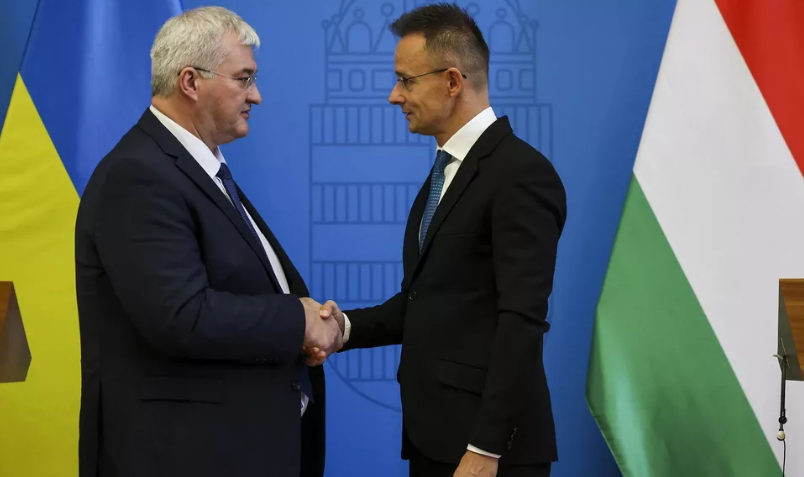
A deepening espionage scandal has plunged Hungary and Ukraine into a new diplomatic rift, with Budapest abruptly suspending planned talks on the rights of ethnic Hungarians in Ukraine’s Transcarpathia region.
According to Ukrainian officials, negotiations that were due to take place on May 12 in Uzhhorod were called off at the last minute by Hungary, despite the Ukrainian delegation already having arrived in the border town. The discussions were meant to address 11 Hungarian recommendations to strengthen the rights of the Hungarian minority living in the southwestern Carpathian region.
The suspension comes amid a growing diplomatic row sparked by Ukrainian allegations of Hungarian espionage. On May 9, Ukraine’s Security Service (SBU) announced that it had uncovered a Hungarian military intelligence network operating on Ukrainian territory. Two former Ukrainian soldiers were detained, accused of collecting sensitive military information for Budapest. The network was reportedly overseen by a Hungarian intelligence officer.
In response, Ukraine expelled two Hungarian diplomats. Hungary retaliated in kind, expelling two Ukrainian officials. Hungarian Foreign Minister Péter Szijjártó dismissed the allegations as “propaganda,” stating that Hungary had not received any formal communication from Kyiv regarding the charges.
Tensions escalated further on Friday when Hungary’s Counter-Terrorism Centre detained a Ukrainian citizen in central Budapest. According to Hungarian authorities, the individual—described as a middle-aged man previously operating under diplomatic cover—was expelled from the country overnight for espionage. The National Directorate General for Aliens determined that his activities posed a “serious threat to Hungary’s sovereignty.”
“The individual was deported after the situation was clarified,” the Hungarian government said in a statement, adding that the suspect no longer had diplomatic immunity.
The deteriorating relations have cast a shadow over longstanding concerns about minority rights in Transcarpathia, where ethnic Hungarians have lived for generations. Hungary has frequently criticized Ukraine for failing to uphold linguistic and cultural rights, while Kyiv has accused Budapest of interfering in its internal affairs.
With both sides now trading expulsions and suspending dialogue, the prospects for resolving the minority rights dispute — or cooling tensions more broadly — appear increasingly uncertain.
The incident marks the latest flashpoint in what has been a historically uneasy relationship between the two neighbours, now further complicated by war, security fears, and mounting geopolitical pressure.
-

 Business12 months ago
Business12 months agoSaudi Arabia’s Model for Sustainable Aviation Practices
-

 Business12 months ago
Business12 months agoRecent Developments in Small Business Taxes
-

 Politics12 months ago
Politics12 months agoWho was Ebrahim Raisi and his status in Iranian Politics?
-

 Business10 months ago
Business10 months agoCarrectly: Revolutionizing Car Care in Chicago
-

 Business11 months ago
Business11 months agoSaudi Arabia: Foreign Direct Investment Rises by 5.6% in Q1
-

 Technology12 months ago
Technology12 months agoComparing Apple Vision Pro and Meta Quest 3
-

 Politics12 months ago
Politics12 months agoIndonesia and Malaysia Call for Israel’s Compliance with ICJ Ruling on Gaza Offensive
-

 Sports9 months ago
Sports9 months agoKeely Hodgkinson Wins Britain’s First Athletics Gold at Paris Olympics in 800m





